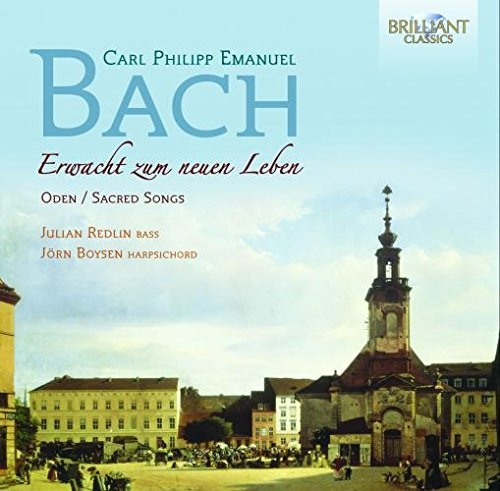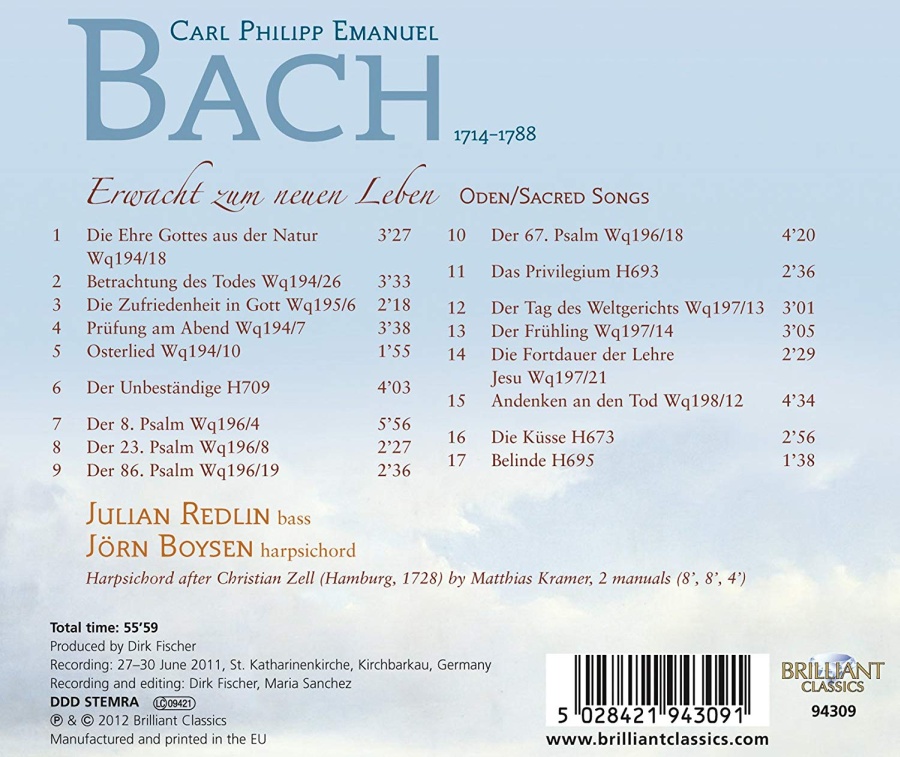
kompozytor
Bach, Carl Philipp Emanuel
tytuł
C.P.E. Bach: Oden / Sacred Songs
wykonawcy
Redlin, Julian;
Boysen, Jörn
Boysen, Jörn
nr katalogowy
94309
opis
Although musical settings of strophic poems were rarely composed or performed in the early years of the 18th century, by around 1730 the genre experienced a renewal of interest. It was in this context that Carl Philipp Emanuel Bach wrote his Oden and Lieder, inspired by a group of German music critics, theorists and composers who believed that music and language could be reunified through song.
• Bach, C P E: Andenken an den Tod, Wq. 198/12 (H752)
• Bach, C P E: Belinde, Wq. 202: B3 (H695)
• Bach, C P E: Betrachtung des Todes, Wq194/26 (H686)
• Bach, C P E: Das Privilegium H693
• Bach, C P E: Der 23. Psalm, Wq. 196/8 (H733)
• Bach, C P E: Der 67. Psalm, Wq. 196/18 (H733)
• Bach, C P E: Der 8. Psalm, Wq. 196/4 (H733)
• Bach, C P E: Der 86. Psalm, Wq. 196/19 (H733)
• Bach, C P E: Der Frühling, Wq. 197/14 (H749)
• Bach, C P E: Der Tag des Weltgerichts, Wq. 197/13 (H749)
• Bach, C P E: Der Unbeständige, Wq. 202:C1 (H709)
• Bach, C P E: Die Ehre Gottes aus der Natur, Wq. 194/18 (H686)
• Bach, C P E: Die Fortdauer der Lehre Jesu, Wq. 197/21 (H749)
• Bach, C P E: Die Küsse, Wq. 199/4 (H673)
• Bach, C P E: Die Zufriedenheit in Gott, Wq. 195/6 (H696)
• Bach, C P E: Geistliche Oden und Lieder Wq194
• Bach, C P E: Osterlied, Wq. 194/10 (H686/10)
• Bach, C P E: Prüfung am Abend Wq. 194/7 (H686/7)
Works:
• Bach, C P E: Andenken an den Tod, Wq. 198/12 (H752)
• Bach, C P E: Belinde, Wq. 202: B3 (H695)
• Bach, C P E: Betrachtung des Todes, Wq194/26 (H686)
• Bach, C P E: Das Privilegium H693
• Bach, C P E: Der 23. Psalm, Wq. 196/8 (H733)
• Bach, C P E: Der 67. Psalm, Wq. 196/18 (H733)
• Bach, C P E: Der 8. Psalm, Wq. 196/4 (H733)
• Bach, C P E: Der 86. Psalm, Wq. 196/19 (H733)
• Bach, C P E: Der Frühling, Wq. 197/14 (H749)
• Bach, C P E: Der Tag des Weltgerichts, Wq. 197/13 (H749)
• Bach, C P E: Der Unbeständige, Wq. 202:C1 (H709)
• Bach, C P E: Die Ehre Gottes aus der Natur, Wq. 194/18 (H686)
• Bach, C P E: Die Fortdauer der Lehre Jesu, Wq. 197/21 (H749)
• Bach, C P E: Die Küsse, Wq. 199/4 (H673)
• Bach, C P E: Die Zufriedenheit in Gott, Wq. 195/6 (H696)
• Bach, C P E: Geistliche Oden und Lieder Wq194
• Bach, C P E: Osterlied, Wq. 194/10 (H686/10)
• Bach, C P E: Prüfung am Abend Wq. 194/7 (H686/7)
nośnik
CD
gatunek
Muzyka klasyczna
producent
Brilliant Classics
data wydania
13-11-2019
EAN / kod kreskowy
5028421943091

(Produkt nie został jeszcze oceniony)
cena 55,00 zł
lubProdukt na zamówienie
Wysyłka ustalana indywidualnie.
Darmowa wysyłka dla zamówień powyżej 300 zł!
Darmowy kurier dla zamówień powyżej 500 zł!
sprawdź koszty wysyłki




























